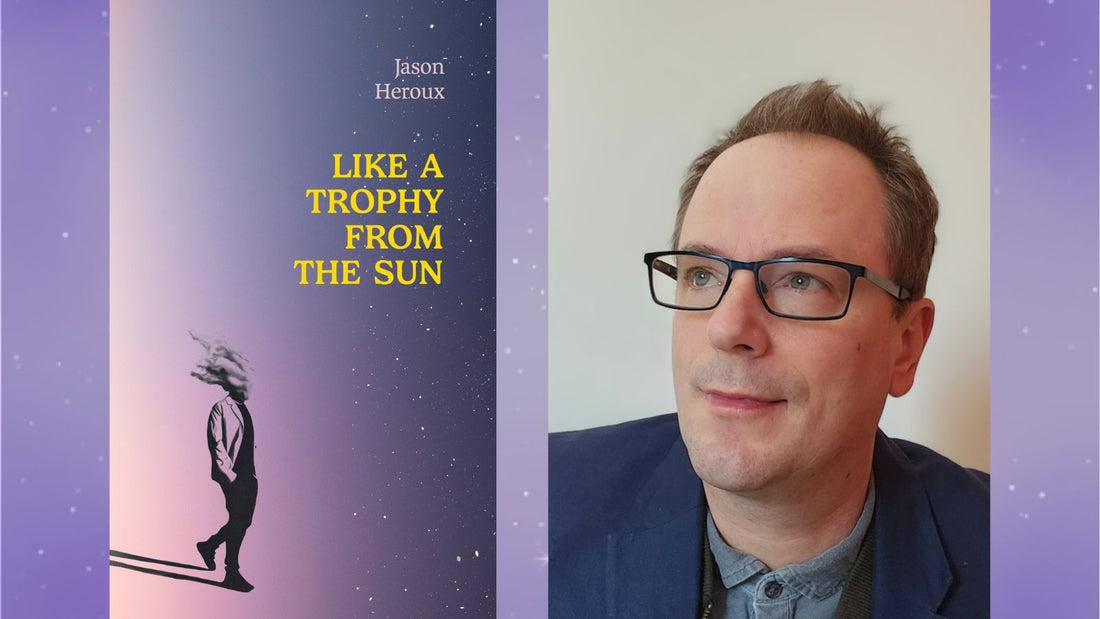An interview with poet Jason Heroux about his new poetry collection, Like a Trophy from the Sun. He discusses surreal poetry, finding inspiration, and tips for writers.
Why did you decide to leave the poems in this collection untitled?
There were a couple of reasons why I left the poems in the collection untitled. One reason was because two of the books that inspired me while writing my collection were Charles Simic’s The World Doesn’t End and David Keplinger’s The Prayers of Others, two collections of untitled prose poetry. I found the lack of titles in those books helped showcase the collections as a sequence of linked poems, like different rooms in the same house. But the main reason the poems have no titles is to increase the element of surprise. A title is a bit like a headline, drawing the reader’s attention and telling them what to expect, or subverting those expectations. I wanted the reader to enter these poems having no idea what to expect.
You have also written novels. Can you talk about the differences/similarities between writing prose poetry and fiction?
The main difference, for me, comes down to a certain general conformance to narrative structure. In fiction, one thing generally leads to another. If someone walks through the rain in a novel, their clothes will probably get wet. If someone puts a pot of water on the stove in a novel, that water will need to boil at some point. In a prose poem, time works differently. Events are more of a collage than a sequence. In a prose poem if someone walks through the rain you have no idea what will happen next.
What advice would you give to writers wanting to write prose poems?
Enjoy the freedom, and write whatever you like. Louise Jenkins once wrote, “The form of the prose poem is the rectangle, one of our most useful geometric shapes. Think of the prose poem as a box, perhaps the lunch box.” I love that. Prose poems may look the same (i.e., a rectangle of prose that looks like a lunchbox), but what’s inside the text, the actual lunch, is pure poetry. Start with a sentence, then another. They don’t have to be related to each other. Each sentence is an ingredient. Enjoy the process, and make yourself a wild and beautiful lunch you can share with others.
How do you approach making contrasting images work together? What is the writing process like? For Like a Trophy from the Sun specifically?
I see writing as the art of foraging. I wander through my inner woods, gathering images here and there, and try not to worry if the disparate images work or not. I trust they are connected, even though I may not recognize their links at the time. The process really is one of trust. I try to approach the blank page as a student, not a teacher. For Like a Trophy from the Sun, the process was playful. Once a poem started, I had no idea where it would go. If a poem got lost along the way, I didn’t force it back into the trail. I left it where it was and wrote a new poem.
How did you come up with the title of this collection? How does it connect to the poems in it?
The title actually changed at the last minute. The original title was Scrambled Wonderland, which was more of a shout-out to Murakami’s title Hard-Boiled Wonderland and the End of the World, which didn’t really have much of a connection to the poems in my book. David Keplinger—whose own book The Prayers of Others was a direct influence on my manuscript—agreed to read the manuscript to provide a blurb. After he read the collection, he suggested another title, and wrote, “My eyes fell on 'Like a Trophy from the Sun.’” His comment resonated with me. It was almost like naming a pet. As soon as I called the book Like a Trophy from the Sun, the collection seemed to recognize its own name, and responded by wagging its tail, ready to go for a walk.
Do you have any tips for writers that may struggle to incorporate surreal elements into poems that centre on mundane images/themes?
Here are two tips, a general one and a specific one. The general tip is to simply try to slow down and pay attention to the world around, and within you. As soon as I started doing this more often I discovered things weren’t as “normal” as they seemed. The surreal will begin to organically appear as part of that process. The specific tip is to write a poem with mundane images/themes and then swap the primary image with something random. For example, here is a mundane poem about the sun: “The sun rose in the sky / it hurt my eyes to look directly at it / and then halfway through the day the sun disappeared behind a cloud.” Swap the sun for a family member and everything changes: “My brother rose in the sky / it hurt my eyes to look directly at him / and then halfway through the day my brother disappeared behind a cloud.”
How do you balance writing about your own experience vs your external observations of the world?
I don’t see the two as mutually exclusive, my own experiences are shaped by my external observations of the world, and vice versa. The balance is essentially about being honest. Like most people, I often feel bewildered by the state of things, and the state of myself. I try to make my poems a safe place for that sense of bewilderment to feel at home.
Do you do anything in particular to become inspired? Where does the inspiration for these unexpected visuals come from?
The inspiration comes from everywhere. Part of the fun of the whole process is trying to surprise myself as I write. And being patient. If you glance quickly at a tree, it looks like a tree. But if you stare at a tree long enough it begins to shift into something almost unrecognizable, and that’s when I’ll start writing about it.
What do you want readers to take away from this collection?
I want readers to be exposed to different perspectives on the page, with the hope that they might start seeing the world differently. Ultimately, I’d like a reader to recognize that there is a lot of weirdness and confusion in our world, and that’s okay. Weirdness and confusion are here to stay.


Jason Heroux was the Poet Laureate for the City of Kingston from 2019 to 2022. He is the author of four books of poetry: Memoirs of an Alias (2004); Emergency Hallelujah (2008); Natural Capital(2012) and Hard Work Cheering Up Sad Machines(2016). His forthcoming books include a short fiction collection Survivors of the Hive (Radiant Press) and two poetry chapbooks: New and Selected Days (Origami Poems Project) and Something or Other (above/ground press).

